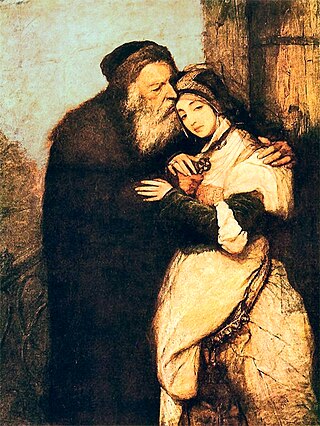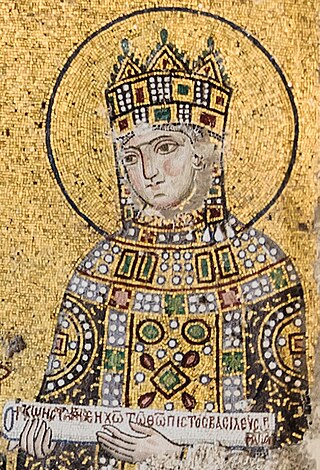Alexandra is a female given name of Greek origin. It is the first attested form of its variants, including Alexander. Etymologically, the name is a compound of the Greek verb ἀλέξειν and ἀνήρ. Thus it may be roughly translated as "defender of man" or "protector of man". The name Alexandra was one of the epithets given to the Greek goddess Hera and as such is usually taken to mean "one who comes to save warriors". The earliest attested form of the name is the Mycenaean Greek 𐀀𐀩𐀏𐀭𐀅𐀨, written in the Linear B syllabic script. Alexandra and its masculine equivalent, Alexander, are both common names in Greece as well as countries where Germanic, Romance, and Slavic languages are spoken.
October 17 is the 290th day of the year in the Gregorian calendar; 75 days remain until the end of the year.
Nadia is a female name. Variations include Nadja, Nadya, Nadine, Nadiya, and Nadiia. Most variations of the name are derived from Arabic, Slavic languages, or both.
Steve is a masculine given name, usually a short form (hypocorism) of Steven or Stephen.
Maggie is a common short form of the name Magdalena, Magnolia, Margaret, Marigold.
Lina is an international feminine given name, mostly the short form of a variety of names ending in -lina including Adelina, Angelina, Carmelina, Carolina, Catalina, Emelina, Evangelina, Evelina Karolina, Italina, Marcelina, Melina, Nikolina, Paulina, Rosalina, and Žaklina.
Danielle is a modern French female variant of the male name Daniel, meaning "God is my judge" in the Hebrew language.

Renée is a French feminine given name and surname.

Jessica is a female given name.
Katrina or Katrine is a feminine given name. It is a derivative of Katherine. People with this name include:
Natalie or Nathaly is a feminine given name of English and French origin, derived from the Latin phrase natale domini, meaning "birth of the Lord". Further alternative spellings of the name include Nathalie, Natalee, and Natalia/Natalija.
Nicole is a feminine given name and a surname.

Barbara is a given name used in numerous languages. It is the feminine form of the Greek word barbaros meaning "stranger" or "foreign". In Roman Catholic and Greek Orthodox tradition, Saint Barbara was imprisoned in a tower by her father. She was then martyred by her father when she refused to renounce Christianity. According to legend, her father was then punished with death by lightning. As such, Saint Barbara is a protectress against fire and lightning. Early Christians occasionally referred to themselves as "barbarians" in opposition to the pagan Romans and Greeks. The story of Saint Barbara is said to have been an inspiration for the fairy tale Rapunzel and other European stories that feature a maiden in a tower.

Diana is a feminine given name of Latin and Greek origins, referring to the Roman goddess Diana. It came into use in the Anglosphere in the 1600s by classically educated parents as an English language version of the French version of the name, Diane.

Zoe, Zoey, Zoie, Zoi, Zoé or Zoë is a female first name of Greek origin, meaning "life". It is a popular name for girls in many countries, ranking among the top 100 names for girls born in the United States since 2000. It is also well used in other English-speaking countries including Australia, Canada, Ireland, New Zealand, and the United Kingdom, as well as in other countries including Belgium, Czech Republic, France, Hungary, Italy, Mexico, Netherlands, Spain, and Switzerland.

Tiffany is a primarily English feminine form of the Greek given name Theophania. It was formerly often given to children born on the feast of Theophania, that is, Epiphany. The equivalent Greek male name is Theophanes (Θεοφάνης), commonly shortened to Phanis (Φάνης) and the female is Theophania (Θεοφανία) or Theophano (Θεοφανώ), colloquially Phani (Φανή).
Nina is a feminine given name with various origins and alternate spellings accordingly. Nina may also serve as a short form of names ending in "-nina/-ina", such as Clementina, Christina, or Giannina; it can also serve as a diminutive form of Anna.
Claudia is a female given name equivalent to Claudius or Claudio. In Portuguese, it is accented Cláudia. A variant and cognate form is Klaudia. It was originally used to refer to any woman who belonged to the ancient Roman Claudia gens. Claudia is a common name in countries that speak Germanic languages and Romance languages.

Veronica is a female given name, a Latin alteration of the Greek name Berenice (Βερενίκη), which in turn is derived from the Macedonian form of the Athenian Φερενίκη, Phereníkē, or Φερονίκη, Pheroníkē, from φέρειν, phérein, to bring, and νίκη, níkê, "victory", i.e. "she who brings victory".
Helena is the Latin form of Helen. People with this name include:







